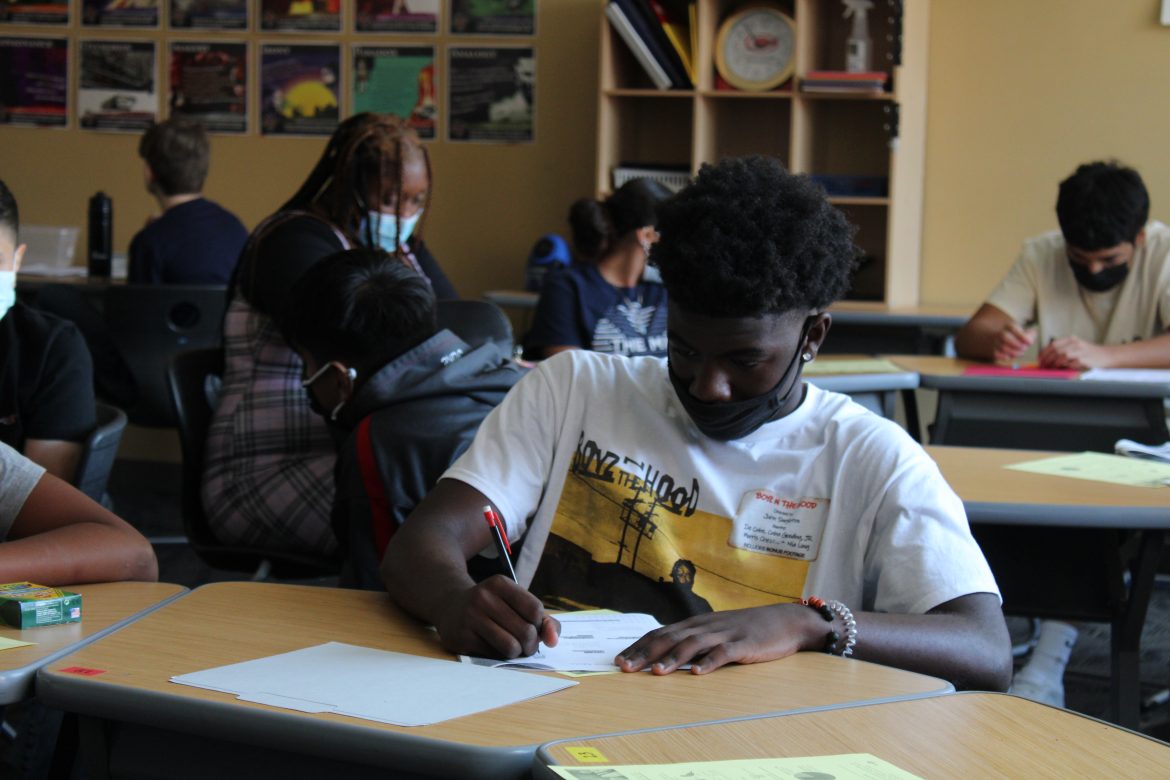A Clarke Central High School student sits at his desk on the first day of school on Aug. 3. According to science department teacher Matthew Regester, being on a block schedule has been beneficial to students preparing for final exams. “I like the block schedule because it makes final exams a bit more rational. When (it was) a full year of doing finals, it was a little iffy, but when (a student has) just a few months, I think students are more prepared for (the final exam) than they were in years past,” Regester said. Photo by Lucas Donnelly
CCHS students are preparing for their final exams and projects which will take place before the start of winter break.
With the 2021-22 school year’s first semester coming to a close, students are now beginning their finals testing at Clarke Central High School.
According to Associate Principal of Instruction Dr. Linda Boza, during the 2020-21 school year End of Course Tests (EOCs) were worth 0.01% of students’ grades compared to the usual pre-pandemic 20% due to virtual learning.
“Last year because of COVID, the state filed a waiver with the federal government to not give (EOCs), (but) the (federal) government said we have to give (EOCs),” Boza said. “So the (Georgia Department of Education) said, well, we have to give them, but they didn’t determine how much it had to be worth so they made it 0.01(%). And because of that, we realized that when you factor that in as a (0.01%), it doesn’t do anything to the grades.”
Because last year’s EOCs were such a small part of a students’ grades, final exams were weighted as summative assessments.
“We didn’t want classes (without EOCs) to have a final because that doesn’t seem fair, so everybody gave one final summative assignment like a last test in the summative category and then we just left that final category (empty),” Boza said.
This year, the weight of EOCs has returned to 20%, so finals have also returned. Science department teacher Matthew Regester believes that some students will either not fully understand the new weight of the exam, or become stressed due to the large increase.
“It’ll be interesting to see how people do, because for many people, they could be a junior or a sophomore in high school and never have taken a final. Then if (it’s) a freshman, (they’ve) never taken a final anyways,” Regester said. “Some classes, like mine, have a final exam. Others have a final project, and then a lot of times when a student has like three or four finals, I think (they) are definitely stressed.”
It is mandatory for freshmen, sophomores and juniors to take final exams and projects, but seniors are exempt as long as they have an A in their classes. Seniors without A’s in their classes are still required to take final exams and complete projects. To prepare for his final exams, senior Kameron Royal has been reviewing the semester’s content in class throughout the past week.
“(Math department teacher Aaron Cavin), who was my Advanced Math and Decision Making teacher, for the past week he gave us a new set of guides for each unit to do and it was finished by the end of that (day), and we use those as study guides,” Royal said. “My Human Anatomy teacher did something similar to it, where we had a study guide of the different questions, but overall, all the units, all in one for each day. So I did those and whatever I messed up (I’d) go and restudy.”
“Returning from online and with (grades composed of) 60% formative, 20% summative (and) 20% final, I’ve had probably more A’s than I’ve ever had and that’s awesome.”
— Matthew Regester,
Science department teacher
Regester predicts that while his students may be nervous about the upcoming exams, the weight of formative assessments and his students’ performance throughout the year will ultimately help students by preventing final exams from changing their grades dramatically.
“Returning from online and with (grades composed of) 60% formative, 20% summative (and) 20% final, I’ve had probably more A’s than I’ve ever had and that’s awesome,” Regester said. “I would imagine (the amount of) A’s on the final exam would be lower, but students also have a lot more buffer from that 60% formative.”
More from Lukas Cornish
More from Maya Clement
